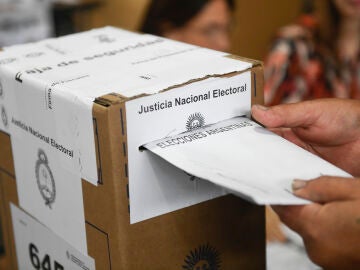
Although all democratic countries have in common that it is the people who decide who forms the Government, in one way or another, not all electoral systems are the same. In Spain, for example, we are not used to hearing terms like ‘curul’, which is the Colombian or Venezuelan version of our ‘seat’, nor to hearing the word runoff. In this specific case it is because in Spain there are no ballots. The word is a graphic adaptation of the French ballottage and refers to the electoral processes that need a second round. In fact, the RAE dictionary recommends, in Spanish, using the term ‘second round’, but both are synonyms.
This runoff or second round does not always take place, although in more polarized societies it is more frequent. The point where elections have to be held in a second round is reached when, in the first round, there is no clearly winning candidate. Each system establishes its minimum and maximum for needing a runoff; In the case of Argentina, so that there is no second round of elections and, therefore, a winner can be established in the first round, one of these two circumstances must remain:
- That the candidate with the most votes has more than 45% of the votes
- That the candidate with the most votes has more than 40% and is at least 10 points away from the second candidate
In the case of the elections in Argentina, this has not occurred. Sergio Massathe Peronist candidate who came in first place, has not reached 40%, but also his main opponent, the far-right Javier Milei, has stayed relatively close. With almost 100% of the election results in Argentina (provisionalfor now), Massa has added just over 36.6% of the votes, while Milei is close to 30%.
Thus, and given that these circumstances have not occurred, It is necessary to hold a second electoral round, which will be on November 19. This day only two candidates face each other, the two formulas with the most votes in the first election, that is, that of Sergio Massa and that of Javier Milei. Of this, Yes, the president is elected of the Nation, as well as the vice president, given that what is presented is a ‘binomial’ made up of the two main candidates.
Other countries with second round elections (runoff)
At the regional level or in small constituencies, there are many countries that they pull second electoral rounds; However, at the national level, only thirty countries have this ballot included in their electoral system:
- Argentina
- Austria
- Bolivia
- Brazil
- Bulgaria
- Chili
- Cyprus
- Colombia
- Costa Rica
- Croatia
- Ecuador
- The Savior
- Slovakia
- Slovenia
- Finland
- France
- Ghana
- Guatemala
- Haiti
- Indonesia
- Peru
- Poland
- Portugal
- Dominican Republic
- Romania
- Serbia
- Ukraine
- Uruguay
- Zimbabwe
In addition to these, the Afghan constitution also provides for the possibility of holding a second round of elections to choose the winner of a process, although in recent years we cannot speak of a democratic system in the country. In 2021, the Taliban took power in Afghanistan by force, two years after the last presidential elections held in the country, in 2019. However, before his arrival (and after the end of his previous regime), there were many complaints of electoral fraud. In Cuba, for example, this system only exists in the case of elections of national deputies in single-member circuits.
Source: Lasexta
Ricardo is a renowned author and journalist, known for his exceptional writing on top-news stories. He currently works as a writer at the 247 News Agency, where he is known for his ability to deliver breaking news and insightful analysis on the most pressing issues of the day.












